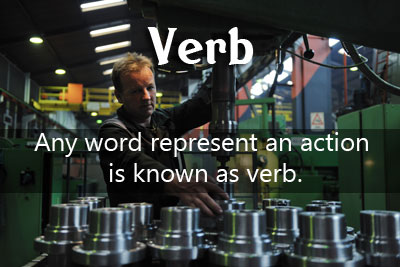
Verb
A verb is a word or a phrase that describes an action, event, condition, experience or a state of being. A verb is one of the main parts of a sentence or a question in English. In fact, no sentence can be constructed and no question can be asked without using a verb. Whether mental, physical, or mechanical, verbs always express activity.
Mainly, there are five groups of the main verbs – Action verbs, Linking verbs, Auxiliary verbs, Finite verbs and Non-finite verbs.
Action Verbs – As the name suggests, action verbs express action (give, eat, walk, etc.) or possession (have, own, etc.). Action verbs can be either transitive or intransitive.
Transitive verbs always have a noun that receives the action of the verb, called the direct object. In other words, a transit verb needs object and usually followed by a noun. For example – ‘Arjun raises his bow’. In the sentence, ‘raises’ is the verb, while ‘his bow’ is the object that receives the verb’s action. So, ‘raises’ is a transitive verb. However, sometimes transitive verbs have indirect objects, which name the object to whom or for whom the action was done. For example – ‘Arnab gave the book to Kunal’. Here, ‘gave’
is the verb, direct object is ‘the book’ and the indirect object is ‘Kunal’.
Intransitive verbs never have a direct or an indirect object. Although an intransitive verb may be followed by an adverb or adverbial phrase, there is no object to receive its action. Example – ‘Amrita dances beautifully’. Here the verb is ‘dances’ and ‘beautifully’ modifies the verb, and there is no object.
Linking Verbs – Linking verbs connect the subject of a sentence to a noun or an adjective that renames or describes the subject. This noun or adjective is called the ‘Subject Compliment’. In other words, instead of an object, a linking verb needs a subjective compliment and the said subjective compliment describes or modifies the subject. Example – ‘Ranjan became a renowned doctor’. In this sentence the verb ‘became’ links the subject ‘Ranjan’ to his compliment ‘a renowned doctor’.
Auxiliary Verbs - Auxiliary Verbs are used to form questions and negative sentences, Usually, they are used with a main verb to form different kinds of tenses. Auxiliary verbs, also known as ‘Helping verbs’, determine the mood and tense of another verb in a phrase. For example, let us take a sentence – ‘It will rain tomorrow’. In this sentence the verb ‘will’ helps the other verb ‘rain’ pointing to ‘tomorrow’. The primary auxiliaries are the various forms of be, have, and do.
It is interesting to note that, the verb “to be” can serve either as a main verb or as an auxiliary verb. When it acts as a main verb, it typically couples a grammatical subject with an adjective (predicate adjective), as in ‘Amal is lean’ or ‘The sunset is amazing’. Or it couples a grammatical subject with another noun (predicate noun), as in ‘Ashok is secretary’, or ‘War is disastrous’. Or it might couple a grammatical subject with a phrase, as in ‘The key is in the drawer’, or ‘She is from the North’.
When it acts as an auxiliary verb, the verb ‘to be’ forms the progressive tense, as in, ‘We are playing football’, or the passive voice, as in ‘The role was played by Rabin’.
Finite verbs – A finite verb expresses tense and can occur on its own in a main clause. These verbs change their forms when there is a change in the number or person of the subject. Finite verbs also have different forms in different tenses. Example – ‘She wrote the story’. In the sentence, she is the subject, wrote is a finite verb and the story is the object.
Non-finite verbs- Contrary to the finite verbs, infinite verbs do not change their form when the number or person of the subject changes. They do not have any subject and do not indicate tense and number in an independent clause or sentence. An infinite verb can occur on its own only in a dependent phrase or clause. Example – ‘They are writing an application’. Here the subject is they, are is the finite verb, writing is the non-finite verb (without indicating tense and number) and the application is the object.